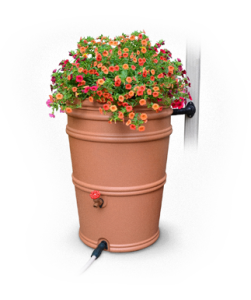GreenSpot Rain Barrel Program Hopes Franklin County Residents “Go Beyond Rain Barrels”
 The GreenSpot Rain Barrel program launched its third season on April 1 with the ambition of encouraging county residents to go beyond rain barrels. “For 2013, we definitely want homeowners to install a rain barrel if that option works for them, but also to think about installing cisterns, and rain gardens or other infiltration practices, reducing their fertilizer use and streamside mowing, and planting more trees,” said Ryan Pilewski who manages the rain barrel program for Franklin Soil and Water Conservation District. “These practices, when instituted widely across the county will make a real difference in our streams.”
The GreenSpot Rain Barrel program launched its third season on April 1 with the ambition of encouraging county residents to go beyond rain barrels. “For 2013, we definitely want homeowners to install a rain barrel if that option works for them, but also to think about installing cisterns, and rain gardens or other infiltration practices, reducing their fertilizer use and streamside mowing, and planting more trees,” said Ryan Pilewski who manages the rain barrel program for Franklin Soil and Water Conservation District. “These practices, when instituted widely across the county will make a real difference in our streams.”
Developed by the City of Columbus and Franklin Soil and Water Conservation District in 2011, the GreenSpot Rain Barrel Program has already reached over 2,000 participants in Franklin County. The program helps homeowners understand how stormwater runoff affects local water quality, streambank erosion and flooding and how they can save money and conserve water and energy by not using potable water on landscaping plants or vegetable gardens.
All homeowners, residing in their homes in Franklin County, are eligible to participate in the online program. At the Web site www.GreenSpotRainBarrels.org, homeowners watch a slideshow that illustrates how rainwater runs off hard surfaces carrying pollutants, eroding streams and adding to flooding. There is also information on the correct installation of rain barrels for safety and efficiency. After passing a ten-question quiz on these topics, the homeowner can order a 45- gallon terracotta-colored rain barrel for $55.00 via PayPal. The barrel is then picked up at the Franklin Soil and Water office at 1328 Dublin Road, Suite 101, Columbus 43215 from 9:00 a.m. to 4:00 p.m. from Monday through Friday. There is also a monthly Saturday-morning pickup time. The first Saturday pick-up date is April 20, from 8:30 a.m. to 12:00 p.m.
Homeowners who live in a participating community are also eligible to attend a workshop where they participate in a rain barrel and stormwater presentation and take the rain barrel home with them. The communities participating in 2013 are Columbus, unincorporated Franklin County (townships outside of municipalities), Canal Winchester, Gahanna, Hilliard, New Albany, Upper Arlington, Westerville and Worthington. The workshop registration form can be printed off the Web site and mailed to Franklin Soil and Water with a check for $55.00. Some communities have requested a combined rain garden and rain barrel workshop in keeping with the idea of “going beyond rain barrels.” The workshops are facilitated by Franklin Soil and Water staff, Metro Parks
staff and volunteers from local watershed groups Friends of Alum Creek and Tributaries (FACT) and Friends of the Lower Olentangy Watershed (FLOW).
Because the GreenSpot Rain Barrel Program is primarily focused on stormwater education, not simply selling rain barrels, there is a limit of one rain barrel per household and homeowners who have participated in the program in the past are not eligible to purchase another rain barrel. There are several local retailers selling the same or similar rain barrels.
Background Information
According to the US EPA, “Stormwater runoff is generated when precipitation from rain and snowmelt events flows over land or impervious [hard, doesn’t let water through] surfaces and does not percolate [soak] into the ground. As the runoff flows over the land or impervious surfaces (paved streets, parking lots, and building rooftops), it accumulates debris, chemicals, sediment or other pollutants that could adversely affect water quality if the runoff is discharged untreated. The primary method to control stormwater discharges is the use of best management practices (BMPs)” (http://cfpub.epa.gov/npdes/home.cfm?program_id=6) (text in [brackets] added). Runoff is transported through the storm sewer system to streams or rivers untreated.
In addition to the pollutants it carries, stormwater is usually warmer than the receiving water creating thermal pollution. It also surges into a stream after a rainfall in such a large volume that the bottom of the stream is scoured and the sides eroded, becoming steep, unvegetated and easily eroded banks. Several communities in central Ohio are experiencing property loss due to added runoff from upstream land-use changes. Some BMPs to control stormwater include infiltration practices such as rain gardens and swales, harvesting rainwater for irrigation, planting trees to intercept and absorb rainwater, and using pervious paving so that rainfall passes through paving or sidewalks instead of running off.


 April 8, 2013
April 8, 2013 








No comments yet... Be the first to leave a reply!